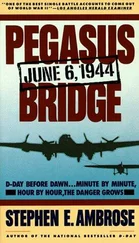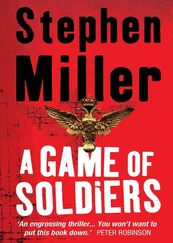Stephen Ambrose - Citizen Soldiers [Condensed]
Здесь есть возможность читать онлайн «Stephen Ambrose - Citizen Soldiers [Condensed]» весь текст электронной книги совершенно бесплатно (целиком полную версию без сокращений). В некоторых случаях можно слушать аудио, скачать через торрент в формате fb2 и присутствует краткое содержание. Жанр: История, на английском языке. Описание произведения, (предисловие) а так же отзывы посетителей доступны на портале библиотеки ЛибКат.
- Название:Citizen Soldiers [Condensed]
- Автор:
- Жанр:
- Год:неизвестен
- ISBN:нет данных
- Рейтинг книги:5 / 5. Голосов: 1
-
Избранное:Добавить в избранное
- Отзывы:
-
Ваша оценка:
- 100
- 1
- 2
- 3
- 4
- 5
Citizen Soldiers [Condensed]: краткое содержание, описание и аннотация
Предлагаем к чтению аннотацию, описание, краткое содержание или предисловие (зависит от того, что написал сам автор книги «Citizen Soldiers [Condensed]»). Если вы не нашли необходимую информацию о книге — напишите в комментариях, мы постараемся отыскать её.
Citizen Soldiers [Condensed] — читать онлайн бесплатно полную книгу (весь текст) целиком
Ниже представлен текст книги, разбитый по страницам. Система сохранения места последней прочитанной страницы, позволяет с удобством читать онлайн бесплатно книгу «Citizen Soldiers [Condensed]», без необходимости каждый раз заново искать на чём Вы остановились. Поставьте закладку, и сможете в любой момент перейти на страницу, на которой закончили чтение.
Интервал:
Закладка:
The B-26 Marauders, two-engine bombers, continued their all-out assault on choke points in the German transportation system, principally bridges and highway junctions. Lieutenant James Delong was a Marauder pilot with the Ninth Air Force who had flown in low and hard on D-Day over Utah Beach. On June 7 it was a bridge at Rennes. "We were being met with plenty of flak from enemy 88s," Delong recalled. "That whomp! whomp! sound just outside with black smoke puffs filling the air was still scary as hell, damaging, and deadly." But there were no Luftwaffe fighters. Most German pilots were on the far side of the Rhine River, trying to defend the homeland from the Allied four-engine bombers, and the Luftwaffe was chronically short on fuel.
In Normandy in June 1944 German soldiers became experts in camouflage to make themselves invisible from the sky, while the GIs laid out coloured panels and did all they could to make themselves plainly visible from the sky. They wanted any aeroplane up there to know that they were Americans, because they knew without having to look that the plane they heard was American.
German general Fritz Bayerlein of the 12th SS Panzer Division gave an account of how the Jabos worked over his division on June 7: "It was terrible. By the end of the day I had lost forty tank trucks carrying fuel, and ninety other vehicles. Five of my tanks were knocked out, and eighty-four half-tracks, prime movers and self-propelled guns." Those were heavy losses, especially for a panzer division that had so far not fired a shot.
The Jabos had a decisive effect on the Battle of Normandy. Without them the Germans would have been able to move reinforcements into Normandy at a better rate than they actually achieved. But air power alone could not be decisive. The Germans in Normandy were dug in well enough to survive strafing, rocket, and bombing attacks. They could move enough men, vehicles, and materiel at night to keep on fighting along the leaf-covered sunken lanes. The frequently foul weather gave them further respite. Low clouds, drizzle, fog-for the Germans, ideal weather to reposition units, and there were more of those days than there were clear ones.
OVER THE first ten days of the battle the Germans fought so well that the Allies measured their gains in metres. By June 16 the euphoria produced by the D-Day success was giving way to fears that the Germans were imposing a stalemate in Normandy. These fears led to blame-assignment and recriminations among the Allies.
The difficulty centred around the taking of Caen. Field Marshal Montgomery had said he would take the city on D-Day, but he had not, nor did he do so in the following ten days. Nor was he attacking. The British Second Army had drawn the bulk of the panzers in Normandy to its front. It was at Caen that the Germans were most vulnerable, because a breakthrough there would put British tanks on a straight road, through rolling terrain with open fields, headed directly for Paris. Therefore the fighting north of Caen was fierce and costly, but there was no all-out British attack.
The Americans, frustrated by their glacial progress in the hedgerows, were increasingly critical of Montgomery. Monty sent it right back. He blamed General Omar Bradley, commanding US First Army, for Allied problems, saying that the Americans should have attacked both north towards Cherbourg and south towards Coutances, "but Bradley didn't want to take the risk."
At the top, through June, the Allied high command squabbled. At the front the soldiers fought through to Cherbourg on the twentieth. It took a week of hard fighting to force a surrender on the 27th, and even then the Germans left the port facilities so badly damaged that it took the engineers six weeks to get them functioning. Meanwhile, supplies continued to come in via LSTs.
With Cherbourg captured, Bradley was able to turn US First Army in a continuous line facing south. St. Lo and Coutances were the objectives of this second phase of the Battle of Normandy. To get them, the GIs had a lot of hedgerows to cross.
THE US First Army was growing to its full potential in Normandy. By June 30 the Americans had eleven divisions in the battle, plus the 82nd and 101st Airborne, which were to have been withdrawn to England but which were retained on the Continent through June. The British Second Army also had thirteen divisions ashore.
The Americans had evacuated 27,000 casualties. About 11,000 GIs had been killed in action or died of their wounds, 1,000 were missing in action, and 3,400 wounded had been returned to duty. The active-duty strength of First Army was 413,000. German strength on the front was somewhat less, while German losses were 47,500.
In most cases the GIs were much better equipped than their foe. Some German weapons were superior; others inferior. In transport and utility vehicles the US was far ahead in both quality and quantity. The Germans could not compete with the American two-and-a-half-ton truck (deuce-and-a-half) or the jeep (the Germans loved to capture working jeeps but complained that they were gas guzzlers). German factories making their Vehicles were a few hundred kilometres from Normandy. Their American counterparts were thousands of kilometres from Normandy. Yet the Americans got more and better vehicles to the battlefront in less time.
The Americans were on the offensive in Italy and in the Pacific and were conducting a major air offensive inside Germany. But the Germans were fighting on four fronts, the eastern, western, southern, and home. They could not possibly win a war of attrition.
The senior German commanders in the West, Field Marshals Gerd Rundstedt and Erwin Rommel, were perfectly aware of that fact. Having failed to stop the Allied assault on the beaches, having failed to prevent a linkup of the invasion forces, completely lacking any air support, and chronically short on fuel sometimes of ammunition-taking heavy casualties, they despaired. On June 28 the two field marshals set off for Hitler's headquarters in Berchtesgaden. On the drive they talked. Rundstedt had already told Hitler's lackeys to "make peace." Now he said the same to Rommel.
"I agree with you," Rommel replied. "The war must be ended immediately. I shall tell the Ftihrer so clearly and unequivocally."
The showdown with Hitler came at a full-dress conference of the top echelon of the high command: Field Marshals Wilhelm Keitel, Alfred Jodi, and Hermann Goring, along with Admiral Karl Donitz and many lesser lights. Rommel spoke first. He said the moment was critical. He told his Ftihrer, "The whole world stands arrayed against Germany, and this disproportion of strength-"
Hitler cut him off. Would the Herr Feldmarschall please concern himself with the military, not the political situation. Rommel then gave a most gloomy report.
Hitler took over. He said the critical task was to halt the enemy offensive. This would be accomplished by the Luftwaffe, he declared. He announced that 1,000 new fighters were coming out of the factories and would be in Normandy shortly. He talked about new secret weapons- the V-2s-that would turn the tide. The Allied communications between Britain and Normandy would be cut by the Kriegsmarine, which would soon be adding a large number of torpedo boats to lay mines in the Channel, and new submarines to operate off the beaches. Large convoys of new trucks' would soon be headed west from the Rhine towards Normandy.
This was pure fantasy. Hitler was clearly crazy. The German high command knew it, without question, and should have called for the men with the straitjacket. But nothing was done.
NUMBERS OF units and qualities and quantities of equipment helped make victory possible for the Americans, but out in the hedgerows those advantages weren't always apparent. Besides, all those American vehicles would be idle until the GIs managed to break out of the hedgerows. And that rested on the wits, endurance, and execution of the tankers, artillery, and infantry at the front.
Читать дальшеИнтервал:
Закладка:
Похожие книги на «Citizen Soldiers [Condensed]»
Представляем Вашему вниманию похожие книги на «Citizen Soldiers [Condensed]» списком для выбора. Мы отобрали схожую по названию и смыслу литературу в надежде предоставить читателям больше вариантов отыскать новые, интересные, ещё непрочитанные произведения.
Обсуждение, отзывы о книге «Citizen Soldiers [Condensed]» и просто собственные мнения читателей. Оставьте ваши комментарии, напишите, что Вы думаете о произведении, его смысле или главных героях. Укажите что конкретно понравилось, а что нет, и почему Вы так считаете.
![Stephen Ambrose Citizen Soldiers [Condensed] обложка книги](/books/346737/stephen-ambrose-citizen-soldiers-condensed-cover.webp)








